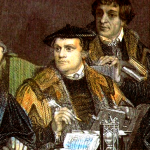Susannah, Jesus & the Church
Part Three of this series shows precisely why young Christians today should ALL know the story of Susannah.
by Fr. Patrick Henry Reardon
 But if Susannah is to be likened to the unjustly accused Joseph, how much more to Jesus in the context of His passion. Both Jesus and Susannah were betrayed in a garden, noted Maximus of Turin, a circumstance that would prompt a further comparison between the two lustful elders and Judas Iscariot. The sorely tried and unjustly accused Susannah, then, becomes a “type” of the Lord in His saving passion. Jerome and Eric of Auxerre remarked that Susannah and Jesus were alike in their being maliciously accused by false witnesses. Other writers noted that both remained similarly silent when indicted. Jerome, for example, when he read of the resounding clamor raised for the execution of Susannah, thought immediately of the loud “Crucify him” uttered against the Lord on Good Friday.
But if Susannah is to be likened to the unjustly accused Joseph, how much more to Jesus in the context of His passion. Both Jesus and Susannah were betrayed in a garden, noted Maximus of Turin, a circumstance that would prompt a further comparison between the two lustful elders and Judas Iscariot. The sorely tried and unjustly accused Susannah, then, becomes a “type” of the Lord in His saving passion. Jerome and Eric of Auxerre remarked that Susannah and Jesus were alike in their being maliciously accused by false witnesses. Other writers noted that both remained similarly silent when indicted. Jerome, for example, when he read of the resounding clamor raised for the execution of Susannah, thought immediately of the loud “Crucify him” uttered against the Lord on Good Friday.
This comparison of the contrived criminal trials of Jesus and Susannah inevitably led to a studied contrast between the radically varying judgments of Daniel and Pontius Pilate. It is a striking resemblance between the Susannah story and Matthew 27:24 that both Daniel and Pontius Pilate believed that the respective trial was ending in a miscarriage of justice, and both claimed to be “innocent of the blood” about to be shed. How different, nonetheless, the two cases! Susannah was saved from the crowd by the bravery of Daniel, whereas Jesus was handed over to the crowd by the cowardice of Pilate.
Even before she was likened to Jesus, however, Susannah was perceived as a symbol of the Church. Indeed, this line of interpretation is already found in our first full commentary on the Book of Daniel, that of Hippolytus of Rome from the early third century:
“It is within our ability to understand the true meaning of all that befell Susannah, for you can find all these things fulfilled in the present condition of the Church.”
For Hippolytus the entire story of Susannah is especially replete with a deep mystic symbolism having to do with the union of the Lord with His Church:
“Susannah prefigured the Church; and her husband Joachim, Christ; and the garden, the summoning of the saints, who are planted in the Church like trees laden with fruit.”
Similarly, Hippolytus finds references to the Church’s sacraments in the details of this account. To Hippolytus, Susannah’s bath in the garden manifestly signifies baptism, in which the Church
“washed herself in order to be presented as a pure bride to God.”
As to the two maids who serve Susannah, these represent faith and love; Hippolytus explains:
“For it is by faith in Christ and love for God that the Church confesses and receives the washing.”
Thus, he goes on to say that the story of Susannah exhorts Christians to
“follow the truth and aim at the exactitude of the faith.”
And the ointments that Susannah requests of her handmaids? Obviously these are
“the commandments of the holy Word.”
The oil, of course, refers to the sacrament of chrismation:
And what was the oil but the power of the Holy Spirit, with which the believers are anointed after their washing. For our sakes all these things were figuratively represented in blessed Susannah, that we who believe in God might not find strange the things that are done in the Church, but believe them to have been presented figuratively by the patriarchs of old.
Still pursuing this symbolism, Hippolytus observes that the entire story takes place in Babylon, a symbol of exile in the world, where the Church is persecuted by two groups of enemies symbolized in the two wicked elders. These enemies of the Church are the Jews and the Gentiles.
“Slaves of the prince of this world,”
these two are forever bringing afflictions on the Church, even
“though they do not agree with one another.”
Alas, Hippolytus goes on, the Church is likewise persecuted by those who are Christians in name only.
Following this last emphasis, but with a less allegorical and more strictly moral interest, other Christians found somewhat different lessons to be drawn from the negative example of these two corrupt elders, or “presbyters.” Thus, in the earliest Christian reference to the story of Susan-nah, Irenaeus of Lyons took them to be examples of wicked, self-serving pastors. Indeed, references to these two elders more than once led Gregory the Theologian to make critical observations about wicked presbyters in the Church. Didymus of Alexandria called them “pseudo-presbyters.”
Christians were also to take note of the rash action of the crowd, criticized by Daniel for being so quick to condemn an innocent woman. This remembrance would always stand in the Church, particularly in her judicial proceedings, as a warning against hasty judgments, a lesson that seems to have made a special impression among the Christians of Syria and Egypt.
The Youthful Hero
In the trial of chaste Susannah, the champion of the hour was, of course, Daniel. The drama of this young man’s sudden appearance is somewhat muted in the Western or Latin tradition, in which the Susannah story forms Chapter 13 of the Book of Daniel, a position that gives the account almost the aspect of an appendix to the book. Far more effective as drama, surely, is the structural arrangement in the traditional Greek text, in which the Susannah story stands at the very beginning. Thus, in the sequence known to Eastern Orthodox Christians, we first meet the character of Daniel in the Bible when his yet boyish voice cries out suddenly:
“I am innocent of this woman’s blood!”
That is to say, the reader hears Daniel, and rather loudly, before he really sees him. Daniel’s first shape, so to speak, is that of a startling prophetic voice ringing out against injustice. Thus, a very young man dramatically takes his stand beside Elijah, Amos, Isaiah, and Jeremiah.
Ambrose compared the wisdom of Daniel in this scene to that of the twelve-year-old Jesus amidst the doctors in the Temple, as described in Luke 2. Cyril of Jerusalem referred to Daniel’s spiritual precocity as manifest in the trial of Susannah, and Ambrose compared him to the prophets Samuel and Jeremiah, both of whom were called at an early age.
God’s Foreknowledge
The case can be made that Susannah’s major contribution to the history of theology is to be found in that line of her prayer where she says to God:
“O Eternal God, Reader of secrets, who know all things before they come to be.”
This is the Old Testament’s clearest expression of God’s knowledge of future events, events which have not yet occurred and which are, in fact, contingent upon the free decisions of men acting within history. It is the mystery of God’s foreknowledge of things that do not yet exist. Susannah invokes God using an adjective essentially related to His ability to know the future—God is “eternal.” He has a single existence, both before and after time; it is all one,
“from eternity to eternity” (Greek text of Psalm 89:2).
As God embraces all time in His eternity, His knowledge of things is not contingent on future historical events in such a way as to render that knowledge doubtful. He embraces history, His majestic freedom in no way lessened by the freedom of human beings who make choices within the historical stream. For He is the everlasting channel, the very bed in which that raging stream races and runs its course.
It is to this eternal God, then, that chaste Susannah commits her destiny, for in His eternity He knows all things, even “before their happening.” This expression of faithful Susannah—even “before their happening”—was to appear repeatedly in Christian literature. Whenever the Church of old sought to give expression to her faith in God’s foreknowledge of history, it was ever to Susannah’s prayer that she had recourse. This line of the prayer was quoted even by Church Fathers who made no other reference to the Susannah story. Starting with the Liturgy of St. James, we find citations of this line and clear references to it universally among the patristic traditions, whether Egyptian, Syrian, Palestinian, Cappadocian, Byzantine, African, Italian, or Gallic.
 At the end of this brief survey of what the story of Susannah has meant to Christian readers from the very earliest times, one is perhaps justified in inquiring just what was accomplished by Luther’s removal of that story from the Bible, in spite of its being contained in every single manuscript of the Book of Daniel, without exception, throughout all of Christian history. I ask, but I do not really expect an answer.
At the end of this brief survey of what the story of Susannah has meant to Christian readers from the very earliest times, one is perhaps justified in inquiring just what was accomplished by Luther’s removal of that story from the Bible, in spite of its being contained in every single manuscript of the Book of Daniel, without exception, throughout all of Christian history. I ask, but I do not really expect an answer.
We know what was lost by Luther’s eccentric decision. It is less clear what was gained.
